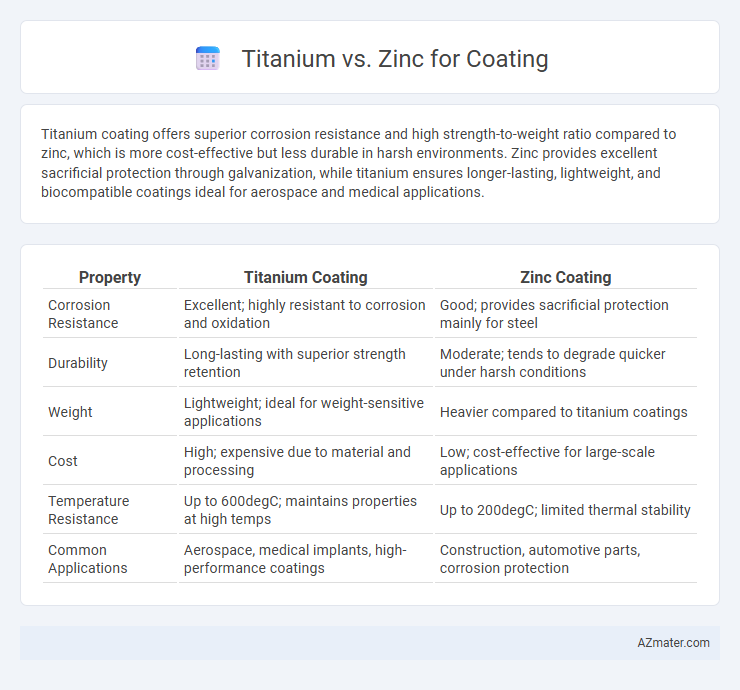Titanium coating offers superior corrosion resistance and high strength-to-weight ratio compared to zinc, which is more cost-effective but less durable in harsh environments. Zinc provides excellent sacrificial protection through galvanization, while titanium ensures longer-lasting, lightweight, and biocompatible coatings ideal for aerospace and medical applications.
Table of Comparison
| Property | Titanium Coating | Zinc Coating |
|---|---|---|
| Corrosion Resistance | Excellent; highly resistant to corrosion and oxidation | Good; provides sacrificial protection mainly for steel |
| Durability | Long-lasting with superior strength retention | Moderate; tends to degrade quicker under harsh conditions |
| Weight | Lightweight; ideal for weight-sensitive applications | Heavier compared to titanium coatings |
| Cost | High; expensive due to material and processing | Low; cost-effective for large-scale applications |
| Temperature Resistance | Up to 600degC; maintains properties at high temps | Up to 200degC; limited thermal stability |
| Common Applications | Aerospace, medical implants, high-performance coatings | Construction, automotive parts, corrosion protection |
Introduction to Titanium and Zinc Coatings
Titanium and zinc coatings serve critical roles in protecting metal surfaces against corrosion, extending the lifespan of structures and components. Titanium coatings provide exceptional resistance to high temperatures and chemical exposure, making them ideal for aerospace and industrial applications. Zinc coatings, known for their galvanizing properties, effectively prevent rust in construction and automotive industries through sacrificial corrosion protection.
Chemical Properties and Composition
Titanium coatings exhibit exceptional resistance to corrosion due to the formation of a stable titanium dioxide (TiO2) layer that provides strong chemical inertness and high durability in aggressive environments. Zinc coatings primarily consist of metallic zinc, which acts as a sacrificial anode to protect steel substrates through galvanic corrosion, effectively preventing rust formation. The chemical composition of titanium offers superior oxidation resistance at elevated temperatures, while zinc's electrochemical properties make it ideal for cathodic protection in atmospheric and aqueous conditions.
Corrosion Resistance Comparison
Titanium coatings exhibit superior corrosion resistance compared to zinc due to their exceptional passive oxide layer, which offers enhanced protection in aggressive environments like seawater and acidic conditions. Zinc coatings provide sacrificial protection through galvanic action but degrade faster in highly corrosive or alkaline settings. For long-term durability and minimal maintenance, titanium is the preferred choice in industrial and marine applications requiring robust corrosion resistance.
Durability and Longevity
Titanium coatings exhibit superior durability and corrosion resistance compared to zinc, making them ideal for harsh environments and prolonged exposure. Zinc acts as a sacrificial anode in galvanization, providing effective but limited protection that diminishes over time due to gradual corrosion. Titanium's exceptional resistance to oxidation and wear ensures longer service life and reduced maintenance costs in metal protection applications.
Environmental Impact
Titanium coatings exhibit superior corrosion resistance and longevity, reducing the frequency of reapplication and minimizing environmental waste compared to zinc coatings. Zinc coatings, while effective in corrosion protection, involve mining and processing methods that contribute to higher carbon emissions and potential soil contamination. The eco-friendliness of titanium aligns better with sustainable practices due to its durability and lower environmental footprint throughout the lifecycle of coated materials.
Cost Analysis: Titanium vs Zinc
Titanium coating typically incurs higher costs due to expensive raw materials and complex processing compared to zinc, which remains more economical and widely used in industrial applications for corrosion resistance. Zinc offers cost-effective protection with readily available materials and simpler application methods, making it suitable for large-scale projects and budget-conscious clients. The choice between titanium and zinc coatings hinges on balancing budget constraints with specific durability and performance requirements, where zinc provides affordability and titanium delivers superior longevity despite higher initial investments.
Applications and Industry Use
Titanium coatings offer exceptional corrosion resistance and biocompatibility, making them ideal for aerospace, medical implants, and chemical processing industries. Zinc coatings provide cost-effective sacrificial protection primarily used in automotive, construction, and infrastructure sectors to prevent rust and extend metal lifespan. The choice between titanium and zinc depends on specific industry requirements such as durability, environmental conditions, and budget constraints.
Installation and Maintenance Requirements
Titanium coatings require precision installation techniques to ensure proper adhesion and corrosion resistance, often needing specialized equipment and trained personnel. Zinc coatings offer easier application with conventional methods such as galvanizing, requiring less stringent surface preparation and lower maintenance efforts over time. Maintenance for titanium coatings is minimal due to their high durability, while zinc coatings may require periodic inspections and touch-ups to prevent degradation in harsh environments.
Aesthetic Qualities and Surface Finish
Titanium coatings provide a sleek, modern aesthetic with a smooth, reflective surface finish that resists tarnishing and maintains color vibrancy over time. Zinc coatings offer a matte or slightly rough texture with a more utilitarian appearance, often developing a natural patina that enhances corrosion resistance but may dull the surface. Both metals contribute to durable finishes, but titanium excels in applications requiring high-end visual appeal and long-lasting shine.
Choosing the Right Coating for Your Needs
Choosing the right coating between titanium and zinc depends on factors such as corrosion resistance, durability, and application environment. Titanium coatings offer superior corrosion resistance and high strength, making them ideal for aerospace and medical industries. Zinc coatings provide cost-effective protection against rust, commonly used in automotive and construction fields for galvanization.

Infographic: Titanium vs Zinc for Coating
 azmater.com
azmater.com